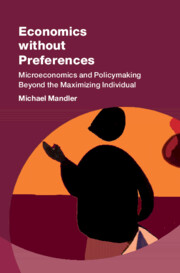Book contents
- Frontmatter
- Contents
- Figures
- Preface
- 1 Introduction: Marginal Utility Matters
- Part I Trade-Offs and Rationality
- Part II Economic Analysis and Policy Without Preferences
- 7 Marginal Utility and the Volatility of Prices
- 8 The Trouble with Welfare Economics
- 9 Welfare and Policymaking: Pareto without Preferences
- 10 Utilitarianism without Utility
- 11 Production and the Enforcement of Rationality
- 12 Conclusion: Custom and Flexibility
- Appendix
- Bibliography
- Index
10 - Utilitarianism without Utility
from Part II - Economic Analysis and Policy Without Preferences
Published online by Cambridge University Press: 02 January 2025
- Frontmatter
- Contents
- Figures
- Preface
- 1 Introduction: Marginal Utility Matters
- Part I Trade-Offs and Rationality
- Part II Economic Analysis and Policy Without Preferences
- 7 Marginal Utility and the Volatility of Prices
- 8 The Trouble with Welfare Economics
- 9 Welfare and Policymaking: Pareto without Preferences
- 10 Utilitarianism without Utility
- 11 Production and the Enforcement of Rationality
- 12 Conclusion: Custom and Flexibility
- Appendix
- Bibliography
- Index
Summary
The social welfare function furnishes the primary tool of normative economics: It aggregates the utilities of different agents, by summing them for example. That technique is no longer available when preferences are incomplete since agents then cannot be modeled by utility functions. Agents can however have well-defined utility functions for groups of goods, though they will not know how to weigh the functions for different groups against one another. A policymaker can aggregate these utilities across agents and thus pin down a unique normatively optimal allocation for each group of goods. Government policies are usually debated in this fashion. Rather than solve a global welfare optimization problem, governments and advocates attack each domain of policymaking separately, whether it be education or health. The chapter’s approach illustrates Sen’s criticisms of welfarism.
- Type
- Chapter
- Information
- Economics without PreferencesMicroeconomics and Policymaking Beyond the Maximizing Individual, pp. 201 - 212Publisher: Cambridge University PressPrint publication year: 2025

